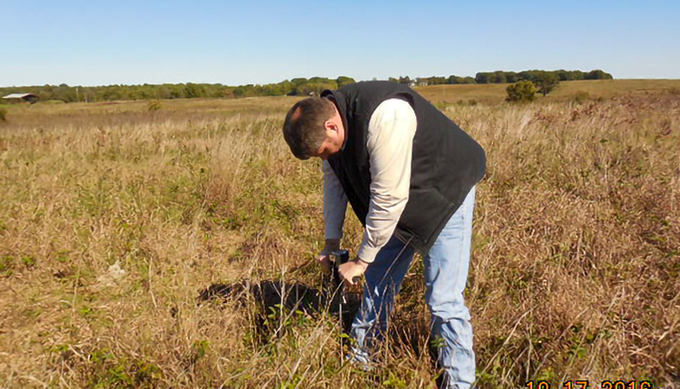May 29, 2025 | 09:47 GMT +7
May 29, 2025 | 09:47 GMT +7
Hotline: 0913.378.918
May 29, 2025 | 09:47 GMT +7
Hotline: 0913.378.918
He recommends testing every three or four years. “If you’re not soil testing, you’re already behind,” he said on March 7 at the Christian County Livestock and Forage Conference in Clever, Missouri. Know what you need when you order fertilizer to avoid a shotgun approach.

Photo courtesy University of Missouri Extension.
Although 2023 fertilizer prices are down from last year, prices are still high enough that a soil test can pay off. See the MU Extension publication “Soil Sampling Hayfields and Row Crops” at this link.
Grazing and haying affect nitrogen levels differently.
Cows that graze pastures recycle nitrogen through the soil with their manure and urine. Legumes that grow in grazed pastures also add nitrogen to the soil. Hay, on the other hand, removes nutrients. “Your grazing management plan is a fertilizer plan,” Schnakenberg says.
Both how we graze and how we feed hay can serve as effective ways of fertilizing the livestock farm and ranch, he says. Move bunks, rings, or roll-out areas around so that cows distribute manure to other parts of the farm. MU research has also confirmed that a well-planned rotational grazing system greatly helps manure distribution in pastures.
Soil tests can help prevent buying and applying unneeded fertilizer. That’s good for the checkbook and the environment, says Schnakenberg.
Schnakenberg offers several other tips to save money on fertilizer:
Legumes such as clovers are also good long-term sources of nutrients. They fix nitrogen for grass hay crops. Incorporate these legumes into pastures to potentially eliminate the need for nitrogen. Legumes take time to reach their full potential, especially if broadcast over the winter or sowed in the spring.
When prices rise, apply phosphate and potash in the fall or early winter. There is little to no loss, and there may even be benefits from early application because there is time to work nutrients into the upper soil profile, where roots can fully access them when needed next year.
Check with your county extension center for the availability of soil testing equipment for loan.
(KTTN)

(VAN) Vikas Rambal has quietly built a $5 billion business empire in manufacturing, property and solar, and catapulted onto the Rich List.

(VAN) Available cropland now at less than five percent, according to latest geospatial assessment from FAO and UNOSAT.

(VAN) Alt Carbon has raised $12 million in a seed round as it plans to scale its carbon dioxide removal work in the South Asian nation.

(VAN) Attempts to bring down the price of the Japanese staple have had little effect amid a cost-of-living crisis.

(VAN) Fourth most important food crop in peril as Latin America and Caribbean suffer from slow-onset climate disaster.

(VAN) Shifting market dynamics and the noise around new legislation has propelled Trouw Nutrition’s research around early life nutrition in poultry. Today, it continues to be a key area of research.

(VAN) India is concerned about its food security and the livelihoods of its farmers if more US food imports are allowed.